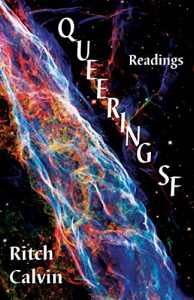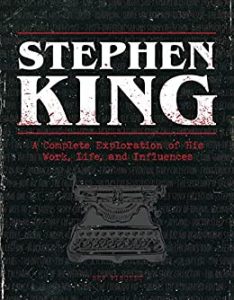The Year in Review 2022 by Alvaro Zinos-Amaro

I can’t, in good conscience, pass up the opportunity to alert readers that Mike Ashley’s The Rise of the Cyberzines: The Story of the Science-Fiction Magazines from 1991 to 2020, the fifth and concluding volume in his magisterial and unrivalled history of SF/F magazines from their inception to the (just about) present, was published in April by Liverpool University Press. Alas, I also can’t discuss the volume in any meaningful way, because I have not seen an e-copy, and the only edition currently available is a hardcover priced $130. Give it some time, though. The excellent preceding volume, which covered the period 1981 through 1990, was published as a trade paperback four years after its original hardcover appearance. Hopefully it won’t take that long with this final installment, but I daresay that even if it does, the wait would be worth it. Meanwhile, John Clute’s Sticking to the End came out from Beccon around the middle of the year. Clute gathers in this, his seventh review collection, material from 2014 onward, offering critical insights on many of the most interesting books published in a period of time that overlaps with Ashley’s survey by six years. Complementing the reviews, which originally appeared in Strange Horizons, are ‘‘Passing Notes’’ on writers like John Sladek and Helen Nicholls, miscellanea like a conversation with John Crowley, and a host of film and television reviews. Clute’s literally encyclopedic knowledge is animated by writing as elegantly stylized, and at times oracular, as ever. What makes this collection stand out from his previous ones is its sheer range: on one page Clute is delving into the ‘‘pre-oxidized badlands’’ of Brian Evenson, and on another expounding on Avengers: Age of Ultron.
Brian Attebery’s Fantasy: How It Works is decidedly more academic, with chapters like ‘‘A Mitochondrial Theory of Literature: Fantasy and Intertextuality,’’ but for readers willing to put in the work, it’s well worth it – and Attebery does offer an ‘‘answer key’’ in Chapter 10 that synopsizes many of his propositions. Half the fun are the close readings and the proliferation of examples enlisted in their support, though. I found chapter nine, with its invocation of Kierkegaard’s concept of ‘‘dread’’ as the kicking-off point for an exploration of the connection between Fantasy and Fear, a standout. In a sense, this book strikes me as a worthwhile companion and successor to Farah Mendlesohn’s influential Rhetorics of Fantasy from 2008. In the course of four richly illustrated chapters, Charting the Afrofuturist Imaginary in African American Art: The Black Female Fantastic by Elizabeth Carmel Hamilton, another academic entry, taps five key concepts to explore the visual language of Afrofuturism, investigating works by Pierre Bennu, Sanford Biggers, Alison Saar, Mequitta Ahuja, Robert Pruitt, Renee Cox, Dawolu Jabari Anderson, Alma Thomas, and Harriet Powers. Hamilton’s cogent and thoroughly educational text represents a genuine achievement of scholarship. There’s a lot to digest here, and I would highlight chapter two, ‘‘Narratives of Fugitivity: Black Feminist Futures in Art History,’’ which concludes that ‘‘visual arts are often ignored in African American studies.’’ Hamilton’s argument that Powers and Thomas are overlooked progenitors of Afrofuturism is persuasive. Consisting of 36 comparatively short pieces, Ritch Calvin’s Queering SF: Readings, whose introduction argues that ‘‘SF and queer are asking the reader to do similar things,’’ tackles narratives across a variety of media, including a number of short stories, novels, including some in translation (e.g. Sayuri Ueda’s The Cage of Zeus), comic books (e.g. Bitch Planet) and television series (Sense8). As Caren Gussoff Sumption pointed out in her Locus review, Calvin’s chosen texts skew contemporary, most likely because as Calvin points out, ‘‘the year 2010 seems to have been a watershed year.’’ Of its four stated aims, I think the book succeeds most in exploring texts not otherwise much examined in modern critical discourse, and in showcasing ‘‘some of the ways in which queer SF pushes at the very generic norms of SF.’’
 2022 was a strong year for volumes focusing on individual authors, particularly in the spaces of fantasy and horror. Paul Kincaid’s astutely organized Brian W. Aldiss, in the Modern Masters of Science Fiction series, was, as expected, sagacious, vigorous, and opportunely challenging of the conventional critical receptions surrounding a complicated, ambitious writer. Those who enjoyed Marc Burrows’s easygoing The Magic of Terry Pratchett – winner of the Locus award for Best Non-Fiction in 2021 – will want to check out Rob Wilkins’s Terry Pratchett: A Life with Footnotes: The Official Biography. Using 24,000 words of dictated material taken down directly by Wilkins near the end of Pratchett’s life as a springboard, the book provides a unique perspective on Pratchett’s life and work from someone close to him personally and professionally. Despite Wilkins’s direct association with his subject, his candor never feels exploitative and is abetted by robust discernment and self-criticality. The chapter titles may be consistently amusing – e.g. ‘‘Rubber Gloves, TV Snobs and an Olivetti on the Line at Waterloo’’ – but Wilkins doesn’t shy away from difficult material, particularly near the end (‘‘it was 2014, and we started losing him at 100mph’’). This is a thoughtful portrait whose poignancy derives, in large measure, from its unsentimentality. S.T. Joshi’s Ramsey Campbell: Master of Weird Fiction, which includes primary and secondary bibliographies, is a comprehensive monograph by an industrious writer who has penned previous volumes on Campbell and has been tracking his career closely for decades now. Following some 20 pages of ‘‘Biography and Overview,’’ Joshi, wary of the tendency of critics writing about lesser-known authors ‘‘to lapse into occasional drumbeating and pompom-waving,’’ takes a thematic approach to Campbell’s oeuvre, tempering his praise with reservations as appropriate, whether regarding technique (‘‘The Claw is, to be sure, somewhat pulpish’’), relative status (‘‘Thirteen Days by Sunset Beach will probably be regarded as one of his lesser works’’), or even title choice (Ghosts Know ‘‘manifestly suggests the supernatural, but there is nothing supernatural here’’). A last chapter on ‘‘Miscellaneous Writings’’ contains an entertaining discussion, among other items, of Campbell’s three novelizations of Universal horror films. This is a useful, impassioned, sometimes disputatious book that will hopefully live up to the author’s wish of being ‘‘merely a preliminary study.’’ Of a different flavor is R.B. Russell’s Robert Aickman: An Attempted Biography, which uses as its starting point Aickman’s two volumes of autobiography, but warns at the outset that these ‘‘need to be read with caution because Aickman’s version of events is not always to be relied upon.’’ By contrast, we should indeed feel comfortable trusting Russell’s account, which is meticulously researched and stems from years of study and careful reflection on Aickman’s ‘‘idiosyncratic stories.’’ Aickman, Russell notes in the chapter on his posthumous reputation, ‘‘did not enjoy a wide readership during this lifetime,’’ and for a while his work was kept alive mainly by small presses, most saliently Tartarus, until finally being relaunched in mass-market format by Faber in 2014. Though I believe the jury is still out on whether Aickman is ‘‘considered the equal of such authors as Henry James’’ in a broad sense, his singularly crafted visions have no doubt accreted acceptance and acclaim, and this will remain the model account of his life for the foreseeable future. (Russell’s recent Fifty Forgotten Books, more digressive and free-flowing in its literary reminiscences, may also entice; many of the authors Russell touches on, such as Arthur Machen, M.P. Shiel, Oliver Onions, and yes, Aickman, are of likely interest to genre readers.)
2022 was a strong year for volumes focusing on individual authors, particularly in the spaces of fantasy and horror. Paul Kincaid’s astutely organized Brian W. Aldiss, in the Modern Masters of Science Fiction series, was, as expected, sagacious, vigorous, and opportunely challenging of the conventional critical receptions surrounding a complicated, ambitious writer. Those who enjoyed Marc Burrows’s easygoing The Magic of Terry Pratchett – winner of the Locus award for Best Non-Fiction in 2021 – will want to check out Rob Wilkins’s Terry Pratchett: A Life with Footnotes: The Official Biography. Using 24,000 words of dictated material taken down directly by Wilkins near the end of Pratchett’s life as a springboard, the book provides a unique perspective on Pratchett’s life and work from someone close to him personally and professionally. Despite Wilkins’s direct association with his subject, his candor never feels exploitative and is abetted by robust discernment and self-criticality. The chapter titles may be consistently amusing – e.g. ‘‘Rubber Gloves, TV Snobs and an Olivetti on the Line at Waterloo’’ – but Wilkins doesn’t shy away from difficult material, particularly near the end (‘‘it was 2014, and we started losing him at 100mph’’). This is a thoughtful portrait whose poignancy derives, in large measure, from its unsentimentality. S.T. Joshi’s Ramsey Campbell: Master of Weird Fiction, which includes primary and secondary bibliographies, is a comprehensive monograph by an industrious writer who has penned previous volumes on Campbell and has been tracking his career closely for decades now. Following some 20 pages of ‘‘Biography and Overview,’’ Joshi, wary of the tendency of critics writing about lesser-known authors ‘‘to lapse into occasional drumbeating and pompom-waving,’’ takes a thematic approach to Campbell’s oeuvre, tempering his praise with reservations as appropriate, whether regarding technique (‘‘The Claw is, to be sure, somewhat pulpish’’), relative status (‘‘Thirteen Days by Sunset Beach will probably be regarded as one of his lesser works’’), or even title choice (Ghosts Know ‘‘manifestly suggests the supernatural, but there is nothing supernatural here’’). A last chapter on ‘‘Miscellaneous Writings’’ contains an entertaining discussion, among other items, of Campbell’s three novelizations of Universal horror films. This is a useful, impassioned, sometimes disputatious book that will hopefully live up to the author’s wish of being ‘‘merely a preliminary study.’’ Of a different flavor is R.B. Russell’s Robert Aickman: An Attempted Biography, which uses as its starting point Aickman’s two volumes of autobiography, but warns at the outset that these ‘‘need to be read with caution because Aickman’s version of events is not always to be relied upon.’’ By contrast, we should indeed feel comfortable trusting Russell’s account, which is meticulously researched and stems from years of study and careful reflection on Aickman’s ‘‘idiosyncratic stories.’’ Aickman, Russell notes in the chapter on his posthumous reputation, ‘‘did not enjoy a wide readership during this lifetime,’’ and for a while his work was kept alive mainly by small presses, most saliently Tartarus, until finally being relaunched in mass-market format by Faber in 2014. Though I believe the jury is still out on whether Aickman is ‘‘considered the equal of such authors as Henry James’’ in a broad sense, his singularly crafted visions have no doubt accreted acceptance and acclaim, and this will remain the model account of his life for the foreseeable future. (Russell’s recent Fifty Forgotten Books, more digressive and free-flowing in its literary reminiscences, may also entice; many of the authors Russell touches on, such as Arthur Machen, M.P. Shiel, Oliver Onions, and yes, Aickman, are of likely interest to genre readers.)
 Irrepressibly enthusiastic Festschrifts rather than formal biographies, but no less impressive for their celebratory and retrospective characters, Phil & Sarah Stokes’ Clive Barker’s Dark Worlds and Bev Vincent’s The Stephen King Ultimate Companion: A Complete Exploration of His Work, Life, and Influences are things of dark beauty. Don’t be deceived by the profuse artwork and numerous photographs. These tomes – Barker’s introduction, dedi cated to readers who ‘‘seek out the odd, the off-kilter, the threatening,’’ doubles nicely for both – shine with acumen on their subject’s creative processes and offer substantive observations on the fruits of these prolific creator’s labors. If the lives of the imaginatively fecund Barker and King were films, these books would be the literary equivalents of commentary tracks comprising an essential, rather than a special, feature. Speaking of which, for readers who gravitate more toward movies and television, I’ll bring this brief overview to a close by mentioning Ryan Britt’s Phasers on Stun!: How the Making (and Remaking) of Star Trek Changed the World and Programming the Future: Politics, Resistance, and Utopia in Contemporary Speculative TV by Sherryl Vint and Jonathan Alexander. The former is an effusively populist but not indiscriminately adulatory tricorder analysis of the multi-universe-, multi-media-spanning life-form known as Star Trek. Britt’s work is compelling in its reminder, shaped by historical context, of Trek’s endless adaptability to its environment, evolutionary dead ends included. In Programming the Future – which in its opening chapter leverages Star Trek as an illustrative case study of ‘‘The Changing Shape of Science Fiction Television’’ – Vint and Alexander formally examine series such as the reimagined Battlestar Galactica, Threshold, Jericho, The Expanse, The 100, Mr. Robot, The Man in the High Castle, Counterpart, and For All Mankind. They apply a primarily ideological lens to examine diverse themes such as the trauma of 9/11, debt culture, the polarization of our political landscape, various challenges to democratic modernity, and fear-driven desires to return to imagined pasts as contrasted with the genuine hopefulness of alternately conceived futures. This volume won’t necessarily have you turning pages in the same breathless rush as Britt’s, but if nothing else, it will encourage you to reprogram your perceptions of familiar SF television narratives.
Irrepressibly enthusiastic Festschrifts rather than formal biographies, but no less impressive for their celebratory and retrospective characters, Phil & Sarah Stokes’ Clive Barker’s Dark Worlds and Bev Vincent’s The Stephen King Ultimate Companion: A Complete Exploration of His Work, Life, and Influences are things of dark beauty. Don’t be deceived by the profuse artwork and numerous photographs. These tomes – Barker’s introduction, dedi cated to readers who ‘‘seek out the odd, the off-kilter, the threatening,’’ doubles nicely for both – shine with acumen on their subject’s creative processes and offer substantive observations on the fruits of these prolific creator’s labors. If the lives of the imaginatively fecund Barker and King were films, these books would be the literary equivalents of commentary tracks comprising an essential, rather than a special, feature. Speaking of which, for readers who gravitate more toward movies and television, I’ll bring this brief overview to a close by mentioning Ryan Britt’s Phasers on Stun!: How the Making (and Remaking) of Star Trek Changed the World and Programming the Future: Politics, Resistance, and Utopia in Contemporary Speculative TV by Sherryl Vint and Jonathan Alexander. The former is an effusively populist but not indiscriminately adulatory tricorder analysis of the multi-universe-, multi-media-spanning life-form known as Star Trek. Britt’s work is compelling in its reminder, shaped by historical context, of Trek’s endless adaptability to its environment, evolutionary dead ends included. In Programming the Future – which in its opening chapter leverages Star Trek as an illustrative case study of ‘‘The Changing Shape of Science Fiction Television’’ – Vint and Alexander formally examine series such as the reimagined Battlestar Galactica, Threshold, Jericho, The Expanse, The 100, Mr. Robot, The Man in the High Castle, Counterpart, and For All Mankind. They apply a primarily ideological lens to examine diverse themes such as the trauma of 9/11, debt culture, the polarization of our political landscape, various challenges to democratic modernity, and fear-driven desires to return to imagined pasts as contrasted with the genuine hopefulness of alternately conceived futures. This volume won’t necessarily have you turning pages in the same breathless rush as Britt’s, but if nothing else, it will encourage you to reprogram your perceptions of familiar SF television narratives.
Alvaro Zinos-Amaro, Roundtable Editor, is co-author of a book of interviews with Robert Silverberg, Traveler of Worlds, that was a Hugo and Locus Award finalist in 2017. Alvaro’s more than 30 stories and 100 reviews, essays and interviews have appeared in magazines like Clarkesworld, Asimov’s, Apex, Analog, Lightspeed, Nature, Strange Horizons, Beneath Ceaseless Skies, Galaxy’s Edge, Lackington’s, and anthologies such as The Year’s Best Science Fiction & Fantasy 2016, Cyber World, Humanity 2.0, and This Way to the End Times.
This review and more like it in the February 2023 issue of Locus.
 While you are here, please take a moment to support Locus with a one-time or recurring donation. We rely on reader donations to keep the magazine and site going, and would like to keep the site paywall free, but WE NEED YOUR FINANCIAL SUPPORT to continue quality coverage of the science fiction and fantasy field.
While you are here, please take a moment to support Locus with a one-time or recurring donation. We rely on reader donations to keep the magazine and site going, and would like to keep the site paywall free, but WE NEED YOUR FINANCIAL SUPPORT to continue quality coverage of the science fiction and fantasy field.
©Locus Magazine. Copyrighted material may not be republished without permission of LSFF.








